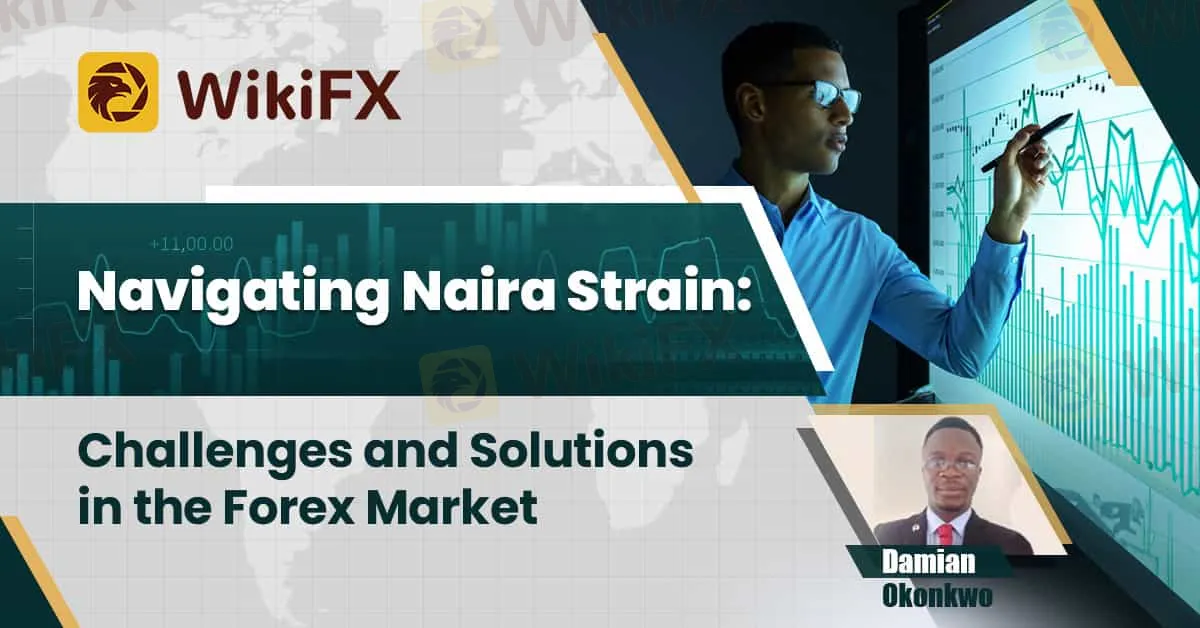简体中文
繁體中文
English
Pусский
日本語
ภาษาไทย
Tiếng Việt
Bahasa Indonesia
Español
हिन्दी
Filippiiniläinen
Français
Deutsch
Português
Türkçe
한국어
العربية
Navigating Naira Strain: Challenges and Solutions in the Forex Market
Abstract:The Nigerian Naira has been under pressure in recent times, grappling with currency depreciation and heightened volatility in the foreign exchange (forex) market. Experts attribute this strain to a confluence of factors, especially the dollar scarcity amidst the high supply of Naira in the market.

By: Damian Okonkwo

Naira Continuous devaluation: Understanding the Challenges:
The Nairas strong devaluation recently has been attributed to several factors:
● Demand-Supply Imbalance: Nigeria's reliance on imported goods creates a constant demand for foreign currency, while oil export earnings, the nation's primary source of forex, have fluctuated due to global oil price movements. This imbalance puts pressure on the Naira's value.
● Policy Uncertainty: Concerns regarding government policies, such as capital controls and exchange rate management strategies, can deter foreign investors and lead to capital flight, further weakening the Naira.
● Global Economic Pressures: Global factors like rising inflation and interest rate hikes by major economies can lead to capital outflows from emerging markets like Nigeria, impacting the Naira's exchange rate.
Navigating the Naira devaluations in the Forex Market:
There are some important strategies that investors could apply to withstand the Naira devaluations. Among them are:
● Hedging Strategies: Businesses and individuals can utilize hedging instruments like forwards, futures, and options contracts to mitigate forex risk and protect their financial positions from adverse currency fluctuations.
● Diversification: Diversifying forex exposure by investing in a basket of currencies can help reduce risk associated with the Naira's depreciation.
● Prioritizing Local Alternatives: Supporting domestically produced goods and services can help reduce reliance on imports and ease demand pressures on foreign currency.
Government Policy and Long-Term Solutions:
The government too has got some important roles to play towards reviving the Naira again. These can include:
● Promoting Non-Oil Exports: Encouraging the diversification of the export base by fostering the growth of non-oil exports can generate alternative sources of forex inflows and reduce dependence on oil revenue.
● Foreign Investment Incentives: Implementing policies that attract foreign direct investment (FDI) can bring in much-needed capital, promote job creation, and boost economic growth.
● Building External Reserves: Maintaining healthy external reserves provides a buffer against external shocks and helps stabilize the forex market during periods of volatility.
Conclusion
The current forex market situation in Nigeria presents a complex landscape, demanding a nuanced approach. By understanding the challenges, adopting appropriate risk management strategies, and advocating for long-term solutions, individuals and businesses can contribute to a more stable and predictable financial environment, fostering economic prosperity in Nigeria.

Disclaimer:
The views in this article only represent the author's personal views, and do not constitute investment advice on this platform. This platform does not guarantee the accuracy, completeness and timeliness of the information in the article, and will not be liable for any loss caused by the use of or reliance on the information in the article.
Read more

High Risk, High Returns: Is This True?
Leverage is one of the most talked-about tools in trading. It promises big returns but comes with huge risks. Traders often wonder if leverage is a blessing or a curse. There are arguments on both sides. Some traders believe it is a game-changer. Others think it can ruin your account. What is your take on this?

FCA Plans to Transform Financial Regulations in the UK
The Financial Conduct Authority (FCA) has revealed plans to reform its regulatory framework to support economic growth in the United Kingdom.

How Arcadia Equity Co Limited Defrauded an Unemployed Woman of RM2.2 Million
An unemployed 46-year-old woman from Selangor fell victim to a sophisticated investment scam, losing a total of RM2,219,217.83. The scam involved a fake company named Arcadia Equity Co Limited, promoted through a Facebook advertisement in August 2024.

IG Group Enters Direct Investment Market with £160 Million Freetrade Buyout
IG Group, a prominent global financial trading and investment company, has announced its acquisition of Freetrade, a commission-free investment platform, for £160 million. The deal, funded through IG’s existing capital resources, marks a strategic move to expand its footprint in the United Kingdom.
WikiFX Broker
Latest News
Plus500 Collaborates with Topstep, Prop firm
Robinhood Launches Crypto Trading Services in Spain
Archax Secures FCA Approval to Oversee Crypto Promotions in the UK
CLS Global Admits to Crypto Fraud
Philippine SEC Urges Caution Regarding Ecomamoni
Become Women Brand Ambassador of Yamarkets
How Often Do U.S. Recessions Impact Online Trading Trends?
Scam Impersonating U.S. Treasury Token Issuance Spreads on Social Media
Naira Falls Against Dollar as Nigeria Reshapes Economic Blueprint
FCA Plans to Transform Financial Regulations in the UK
Currency Calculator


